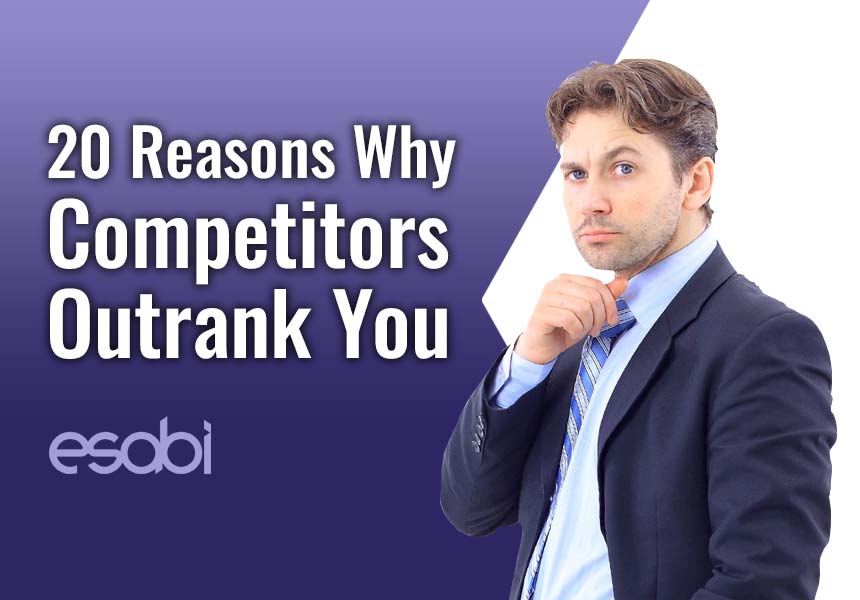It’s a common question that we get asked all the time.
Companies who want to beat their nearest competition always want to know – “why are my competitors outranking me?”
Well, the simple answer is there’s no single factor alone to determine this.
It could be a number of factors.
But as most knowledgeable SEO’s will tell you, there are some factors that influence rank far more than others.
So let’s look at the top reasons why your site is being outranked by your competition.
Table of Contents
1. Lack of Inbound Links
 Image source: https://pixabay.com/photos/world-europe-map-connections-1264062/
Image source: https://pixabay.com/photos/world-europe-map-connections-1264062/
No matter what anyone says, inbound link signals are still the most influential ranking factor there is. Period.
Google’s PageRank system still greatly relies on link signals to determine which sites rank higher than others.
That doesn’t look like it’s about to change any time soon.
Of course, what has changed in recent years is the quality of links required.
Your site could have a thousand links from numerous sites, yet your competitors may only have a dozen or so links and still outrank you. And why?
Because the links they have acquired are clearly from higher trust, higher authority sources which carry greater weight.
So quality is not necessarily better than quantity.
But what is clear is that links from powerful sources carry huge ranking benefits.
A link audit of your nearest competitors backlinks will reveal the true extent of why they may be outranking you.
2. Toxic Inbound Links
 Image source: https://pixabay.com/photos/computer-virus-hacker-4282378/
Image source: https://pixabay.com/photos/computer-virus-hacker-4282378/
So you hired an SEO who promised you top Google ranks for an unbeatable price. It was too good to resist.
Many months later and several hundred dollars lighter, you find your site is still not ranking or worse, has tanked!
Chances are you just hired a blackhat SEO who used techniques that will not only do your site harm, but could get you banned from Google – for life!
As mentioned in the previous point, links are vitally important to rank in Google. But if those links are toxic, you’re in big trouble.
The sad fact is, many business owners get seduced by fake promises at rock bottom prices and invariably, get ripped off.
When you hire an unscrupulous blackhat SEO, you are putting the entire future of your business at the roulette table.
If that gamble goes wrong, which invariably they do, they’ll disappear with your money whilst your site goes into search engine oblivion.
When building links, always build ethical whitehat links from trusted sources.
Yes, the cost may be significantly higher, but you get what you pay for.
3. Lack of On-Page Optimisation
 Image source: https://pixabay.com/photos/code-javascript-programming-3337044/
Image source: https://pixabay.com/photos/code-javascript-programming-3337044/
You might have a great looking website but if it’s not been optimised, the chances are it won’t rank for your target keywords.
Anything as simple as the title tags, descriptions, headings and keyword density of your content might be the reason why your site simply isn’t performing as you’d expect.
The fact is, if you haven’t done the basics such as research the most suitable keywords and then optimised specific pages to target those phrases appropriately, you won’t rank.
4. Thin Content
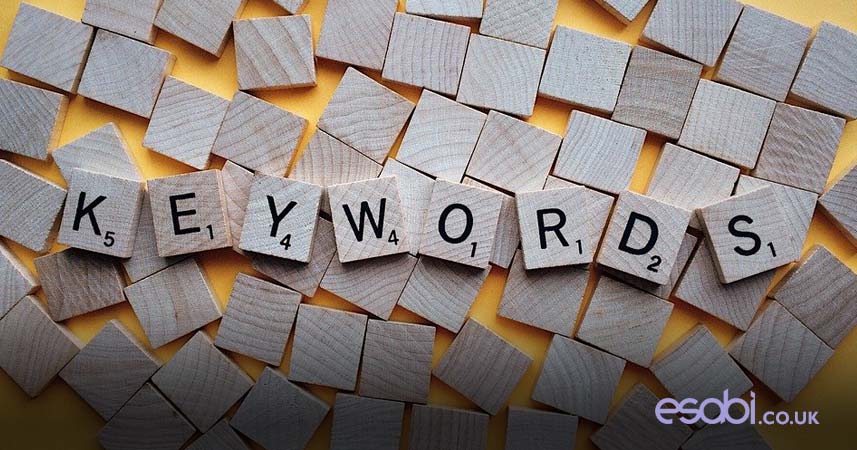 Image source: https://pixabay.com/photos/keywords-letters-scrabble-word-2041816/
Image source: https://pixabay.com/photos/keywords-letters-scrabble-word-2041816/
If your website is made up of just a handful of pages, all of which contain just a few dozen words each maximum, then you’re suffering from thin content.
Thin content rarely ever ranks and in fairness, why should it?
If your competitors have taken the time to carefully research their subjects and write detailed and informative content on their pages, they deserve to outrank you.
If you’ve only spent minutes writing basic bumph that is effectively filler, is it any wonder you struggle to be found on search engines?
5. Poor Quality Content
 Image source: https://pixabay.com/photos/coffee-cafe-brown-cup-aroma-3752811/
Image source: https://pixabay.com/photos/coffee-cafe-brown-cup-aroma-3752811/
So your site does have a lot of content, but is the quality of that content appealing to your audience?
Search intent plays a massive part in understanding how to devise and create content that people are actively searching for.
If you’re just guessing what to write about and are not taking the necessary time to research and discover what subjects people are actively looking for, you’re simply wasting your time.
We see countless examples of sites that have page after page of blog posts, yet most of them only attract a handful of pageviews. Why?
Because most of the articles are written about or target subjects that no one’s interested in.
Quality content starts with good research.
If you know what your audience wants to read about, writing content on those subjects becomes so much easier.
And best of all, the better your content the higher it will rank.
The higher it ranks, the more free traffic you get. It really is that simple!
6. Duplicate Content
 Image source: https://pixabay.com/photos/stormtrooper-star-wars-lego-storm-1343772/
Image source: https://pixabay.com/photos/stormtrooper-star-wars-lego-storm-1343772/
Is your site stuck in a constant loop of repeating itself, where page after page contains similar if not exactly the same content?
Or worse, have you committed the cardinal sin of copying content from another source and pasting into your pages?
At best, that is lazy. At worst, sloppy.
The content on your site should be unique to you and you alone.
If you can find various other copies of that same content elsewhere, Google will just decide to rank the site that it originated from and ignore you.
So if you’re guilty of this practice, get writing or hire a professional copywriter to start replacing all of your site content with better quality verbiage.
7. Poor SEO Methods
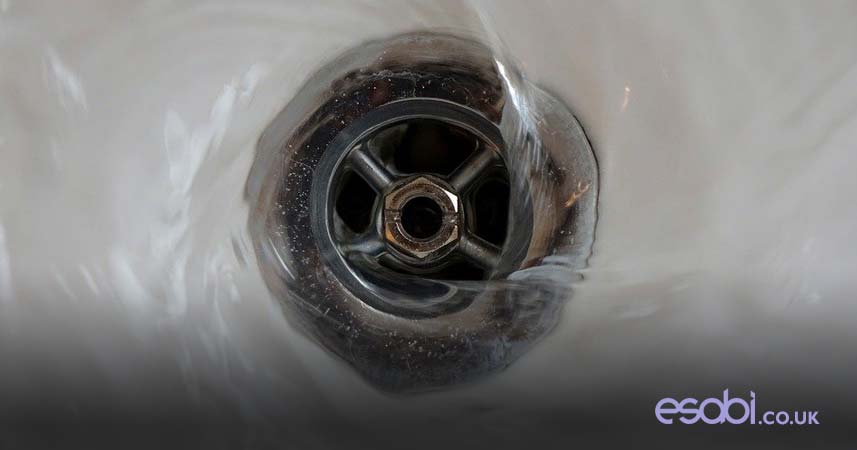 Image source: https://pixabay.com/photos/drain-bathroom-sink-sanitary-water-2454608/
Image source: https://pixabay.com/photos/drain-bathroom-sink-sanitary-water-2454608/
You might think that your site has been optimised but if it isn’t ranking, think again.
Poor optimisation such as keyword stuffing or over-optimisation by trying to target too many phrases and keyword variations is effectively just watering down.
If your site hasn’t been optimised page-by-page at source code level, chances are it hasn’t been optimised at all.
In reality, good SEO practice is just common sense.
If the content of your pages do not match the keywords that you wish to target from top to bottom, it’s highly unlikely they will outrank your competitors.
8. Site Has Been Penalised
Have you checked to see if your site pages are actually indexed by Google?
A simple search operator in Google such as “site:yourdomain.com“ will reveal if your site pages are in Google’s index.
If no results or only a handful of results show, chances are you may have been penalised or your site has been deemed low quality.
A penalty can be imposed for numerous reasons, but the most common is due to toxic unnatural link building or spammy SEO techniques.
If you suspect you have been penalised, speak to your SEO and ask about the techniques they have employed.
Most specifically, ask for a list of links they have built.
If the links appear spammy or toxic, then chances are you’ve received an algorithmic penalty.
Also important to note is some sites still receive manual action penalties.
This occurs when Google’s search team deems you have deliberately built unnatural links in an attempt to manipulate Google search results.
If this has happened, check Google Search Console for any “Manual actions”
If you’ve received one, you’ll need to hire a Google Penalty Removal specialist to get you back in the search results.
9. Lack of Citations

If you’re struggling to see your business listed in Google’s local pack of results, your site may be lacking in local citations.
Citations and directory listings go a long way to help Google identify you as a local business.
The more you have from quality, relevant directories, the better the chances are you’ll rank well for local searches.
10. Brand Reputation
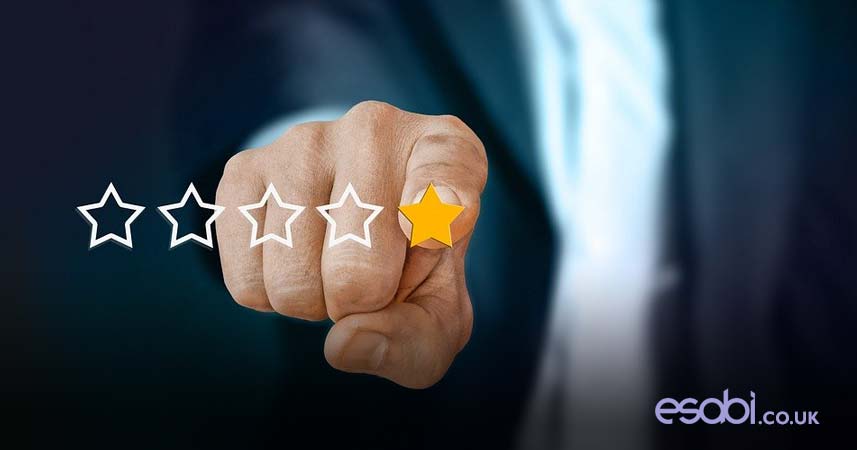 Image source: https://pixabay.com/photos/criticism-write-a-review-review-3083100/
Image source: https://pixabay.com/photos/criticism-write-a-review-review-3083100/
Sometimes, it’s hard to rank simply because your brand has not built enough of a reputation to be recognised as a trusted source.
Whether you’re selling a product or service, reputation counts.
The best way to improve your reputation and brand recognition is to get reviews from real world customers.
There’s numerous sites that collect customer reviews ranging from TrustPilot, Yelp, Google Places, Bing Places, Foursquare, Yellow Pages and more.
If you’re not on sites like these and not receiving reviews, it’s hard to build any kind of reputation.
11. Social Signals

It goes without saying that social media is massive in today’s digital world.
If you’re not using any of the top social media platforms, then you must be stuck in the dark ages.
Social media not only helps to increase your brand recognition, it enables you to directly engage with an active and participating audience.
In the main, mentions and links from social media sites do not hugely influence search engine ranking directly.
But what they do achieve is a great way to gain greater exposure and enhanced reputation, which all goes towards building trust and authority.
Two factors that are hugely important in Google’s ranking algorithms.
12. Site Is Not Indexable
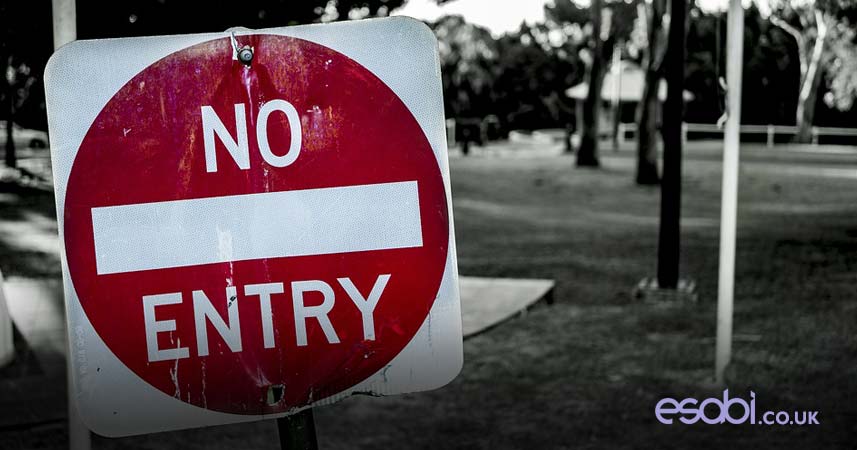
One common issue we see is that many sites struggle to rank because they’re not indexable.
For starters, your site should generate a dynamic XML sitemap that tells Google precisely how your site hierarchy is structured.
By doing so, Google knows exactly how many pages your website contains, where to find them and how to index them.
Sites without a sitemap can still get indexed, but the process is far slower and less reliable.
On the flip-side, it’s not uncommon for sites to invariably block indexers via the robots file, which prevents your pages from being found at all!
This often happens when a website is under construction, and the developers want to hide the site from Google whilst it is being built.
Yet once deployed live, they forget to switch this feature off, thus preventing Google from indexing it.
As a result, traffic falls off a cliff and everything goes very dark very quickly!
13. Bad Markup
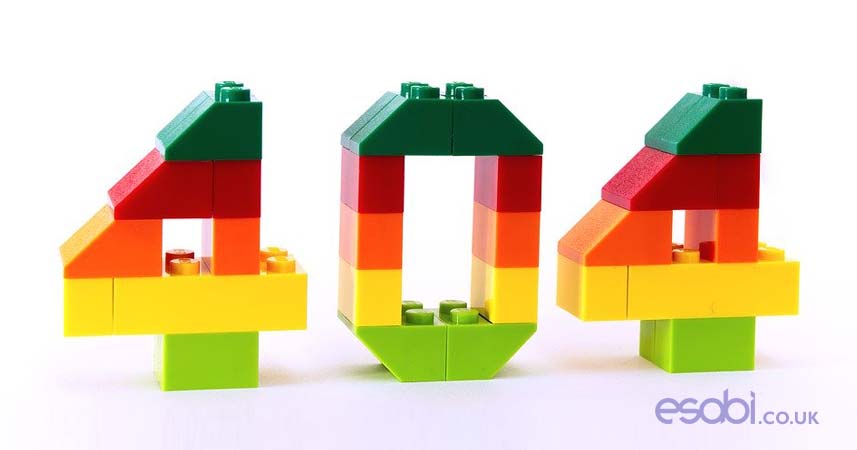
In some rare cases, a website’s source code may be so poorly conceived that Google simply cannot decipher it.
Nowadays, most sites are built on open source CMS systems like WordPress, Drupal or Joomla, all of which have good markup and have no problems being indexed.
But there are still some cases where developers insist on writing website source code from the ground up, and miss out a whole plethora of essentials that influence ranking.
In these cases, rectifying these issues can be timely and expensive as the whole site has to be audited and re-coded.
So if you’ve been sold a site by a developer that has pushed the idea of custom code being the best way forward, tread with extreme caution.
It might be one of the worst decisions you ever make!
14. Mobile Unfriendly

Most people are unaware that Google switched to Mobile First indexing quite some time ago.
What this effectively means is that Googlebot will now favour sites that are mobile friendly and index them.
This makes complete sense as in recent years, mobile internet usage has overtaken desktop internet usage.
So understandably, websites need to be useable on mobile devices even more than desktop.
If your site is not mobile friendly, this could be a major factor why you don’t rank.
To find out if your site is mobile friendly, you can use the online test at https://search.google.com/test/mobile-friendly
15. Page Load Speed

No one likes a slow website.
It’s frustrating and if it takes too long to load, you just give up.
If your site takes an age to load, not only will no one use it, it won’t rank well either.
Mobile users will struggle to load an over-bloated site on a 3G or 4G connection, and Google knows this.
If you suspect your site is slow to load, use the online tool at https://developers.google.com/speed/pagespeed/insights/ to find out.
The report will detail if your site is slow and where to make fixes.
16. Poor Image Optimisation

Continuing from point 14 above, overly large and poorly optimised images can contribute hugely to slow page load speed.
It’s very common to find lazy website developers create web content using stock images on webpages without bothering to scale them down to the exact size required, and optimise them as best as possible.
For example, an image downloaded straight from a stock library can easily be in excess of 1.5-2MB in size.
Imagine a page that contains several images and you have a recipe for disaster.
The total page size will be in excess of several megabytes and will load extremely slowly, leading to a poor user experience.
All it takes is for the developer to resize the image to the precise pixel dimensions required, and then compress it using a web friendly format.
17. Poor UX (User Experience)

Is your site an absolute nightmare to navigate?
Perhaps the content on your site is not very useful or perhaps the buyers experience is poor?
Session times and time on page are just two metrics that Google tracks via its Analytics system.
If a trend develops that shows user session times on your site are low, bounce and exit rates are off the charts, then it has become apparent that the user experience on your site is a poor one.
When that happens, your ranks fall.
18. Lack of Updates
Has your site been left to float in the wind for months on end, with no updates?
Guess what? Google knows this.
A site that lacks updates and any fresh content rarely ever gets re-indexed.
Even if you have spent time trying to improve your content and re-optimise several elements of your site, it may take a while for those changes to reflect as Google doesn’t deem your site important enough to revisit it.
So if you’ve just allowed your site to stagnate, now’s the time to change your ways.
19. Site is Insecure

In this day and age, surfing the web needs to be secure.
Anyone visiting your website needs peace of mind that your site is safe and secure to use.
Google has long given preferential treatment to sites that are running on a valid SSL certificate under HTTPS.
So if your site is still running on an insecure protocol, it’s time to switch to a secure host asap.
20. Domain Age
Although not hugely important, older domains can rank better as they will naturally have some history, whether links or reputation.
So if your business is new, you may need to be a little more patient as establishing yourself may take some time.
Alternatively, you could purchase an aged domain that has good metric and solid authority, and choose to use that instead.
Conclusion
In this article we have comprehensively covered 20 reasons why your competitors are outranking you.
As you can tell, getting to the top of Google is a varied and complex process, bu tone that requires a broad based approach to achieve the desired results.
Put simply, there’s no quick fixes or shortcuts to the top.
If you want to beat the competition, you have to put in the work.
So best of luck using our list above and of course, if you have any questions or concerns, leave them in the comments section below.

